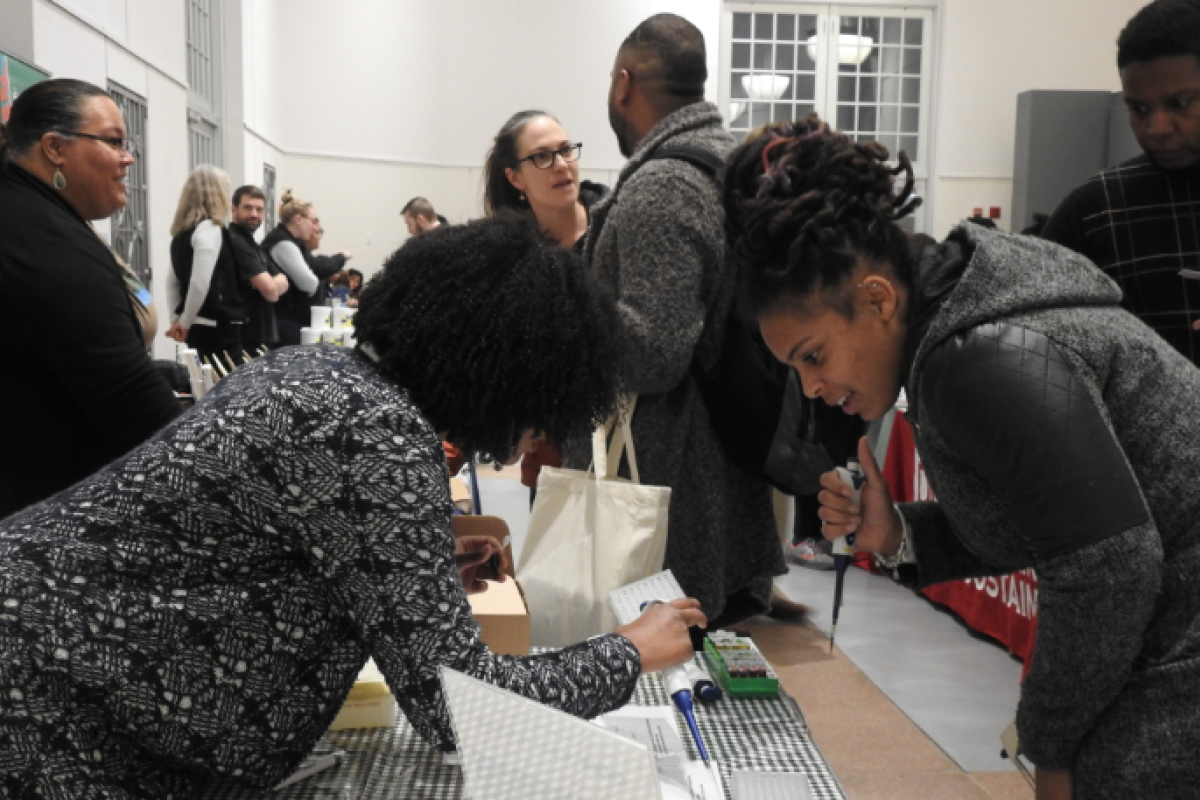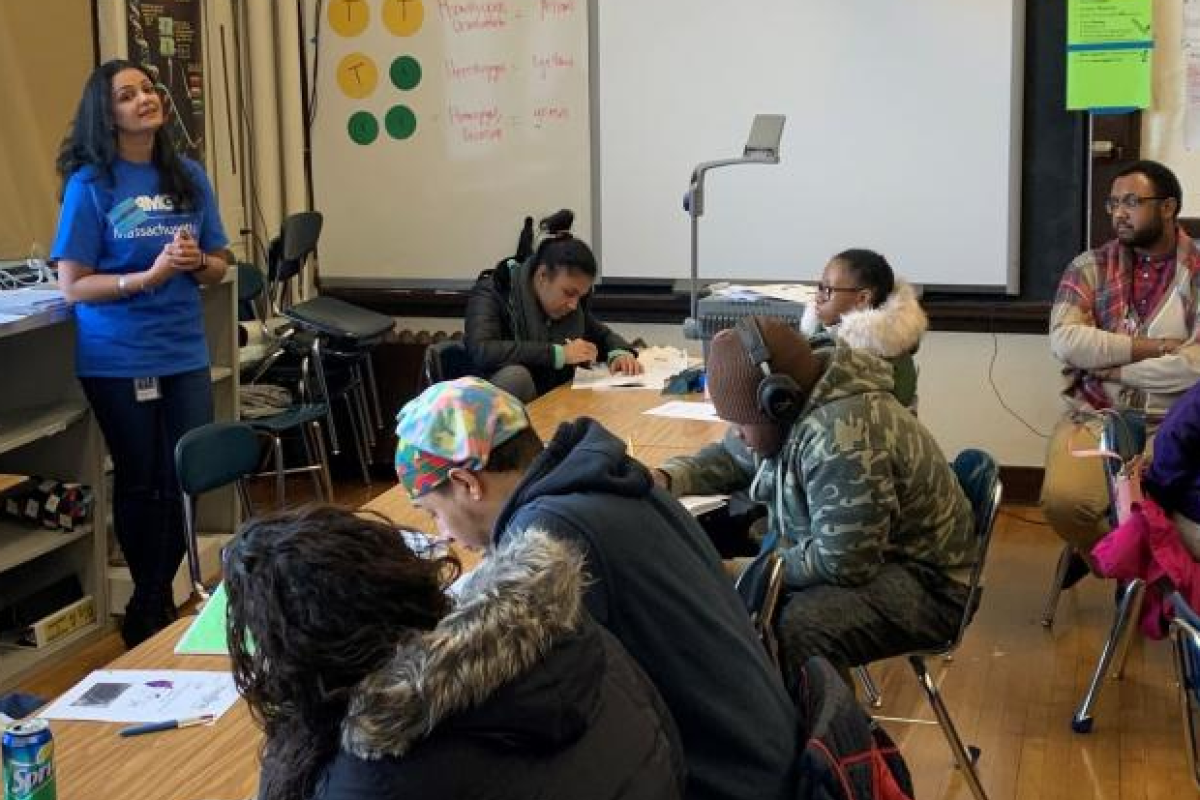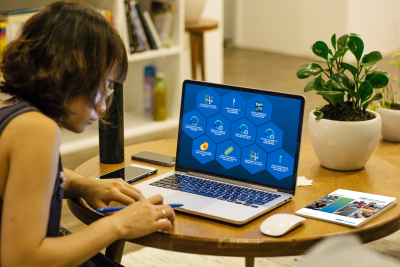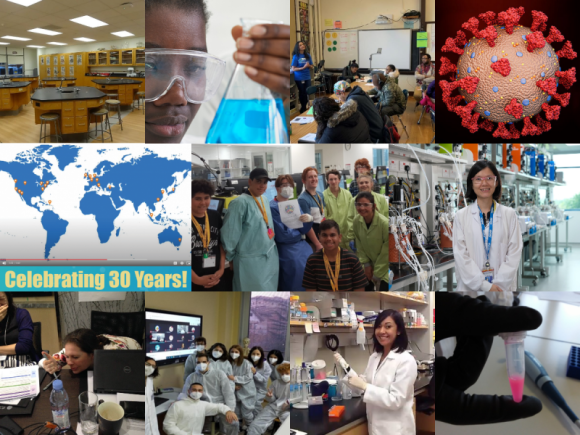The ABE Program Office wishes all of its program site staff, teachers, students, and ABE friends and family everywhere a very happy new year!! As we open the year 2021, we are excited to look back on all of the ABE program’s achievements from the past year.
Communities of Practice
2020 was the best of times and the worst of times for the ABE community. Faced with school closures, travel bans, and an avalanche of virtual meetings, the ABE community pulled together to share resources, ideas, and positivity despite—or even because of—adverse circumstances.
Scientific Inquiry Working Group: In what we didn’t realize would be our last face-to-face meeting of the grant cycle, representatives from nine program sites convened in February of 2020 at Harvard University to reimagine ABE as an adaptable and flexible program, integrating inquiry, increasing accessibility, and infusing innovation and cutting-edge concepts.

Professional Learning Working Group: Soon after borders closed and travel bans began, representatives from seven program sites joined the virtual professional learning working group to identify a working set of common goals for and characteristics of ABE professional learning, as well as strategies for evaluating professional learning at the site level.
Evaluation Working Group: Instead of the face-to-face meeting originally planned, representatives from nine ABE sites gathered for a virtual meeting to make connections between the ABE program-wide logic model and local programs and activities; articulate common teacher and student outcomes across sites; and identify strategies for evaluation data collection and measurement across sites.
Equity, Access, and Engagement Working Group: Initially convened in response to widespread racial injustice and systemic anti-Black oppression in the U.S. and the resulting public response to these ongoing issues, the ABE Equity, Access, and Engagement working group began meeting in July to identify systemic strategies to dismantle structural racism within and surrounding the ABE program. The working group identified four key challenges to focus on immediately, with significant steps already underway within each area:
- We are not reaching teachers in schools serving high percentages of Black students (in the U.S.) to increase their understanding, value, desire, and ability to teach ABE.
- We are not recruiting enough Black leaders and partners to lead and staff ABE program sites in the U.S.
- We do not have Black representation and leadership at the ABE Program Office.
- Digital inequality creates limits on access to ABE for U.S. communities with high BIPOC representation.
As they continue to meet in 2021, the group is finalizing a common vision and strategic plan and action steps to be taken at all levels of the ABE program, with an expanded focus on all groups that are underrepresented in STEM.
LabXchange Working Group: Within the global climate of a pandemic, as LabXchange quickly became a primary medium through which science teachers everywhere could virtually connect with their students, members of the ABE community worked with the LabXchange team to identify and align key assets and pathways to support the ABE curriculum and labs.
Mini-Curriculum Working Group: During development of ABE’s new curriculum modules, the Mini-Curriculum Working Group had the opportunity to review outlines and drafts of the materials before publication, including Responding to a Mystery Illness and Clinical Trials: From Disease to Medicine.
Virtual Meetings: Quarterly virtual meetings proved to be a stable norm and constant from the pre-pandemic world. ABE program sites joined each other virtually each quarter in all-staff and lab technician meetings to share updates and impact on their programs due to school closures and ever-changing health and safety regulations. As the year progressed, sites that were able to reopen under a variety of safeguards were able to share resources, tips, and troubleshooting strategies with sites who were still facing the unknown. The ABE community truly pulled together to support one another, share a human connection, and keep ABE alive in an environment nobody could have predicted 1 year earlier. Looking back, the ABE community has been a shining example of how a virtual international group located thousands of miles apart from one another can still feel like a family.
Volunteer Program

The ABE Volunteer Program, which was busy bringing Amgen staff into ABE classrooms during the start of 2020, halted all in-person visits when the COVID-19 pandemic struck. But once teachers started feeling more comfortable with teaching virtually, the program started setting up virtual visits with huge success. November 2020 saw the beginning of a new year of the program offering virtual classroom visits again. But this time, the program also invites Amgen staff to take part in surveys and audio and video interviews to share the paths they’ve taken to their careers in biotech. The program expanded to six U.S. ABE sites (Massachusetts, San Francisco, Los Angeles, Rhode Island, Washington DC, and Tampa) this year. We also started piloting a new matching service, SmartMatchApp, to best match volunteers and teachers. We hope 2021 seen in-person visits back on the schedule again.
New Teaching Resources

2020 brought a number of new teaching and learning resources by the Program Office for ABE classrooms, most of them incredibly relevant to the events we watched unfold around us.
- Saving a Life: Just before the pandemic took hold, we made this curriculum module available online. It was originally developed by ABE The Netherlands and follows a man who was found unresponsive and the professionals who diagnosed him based on the evidence at hand.
- Resources for virtual learning: In March, schools were closing suddenly because of the pandemic. The ABE Program Office quickly got to work to develop and find resources to our teachers to help them as they transitioned to virtual teaching.
- Responding to a Mystery Illness: With the pandemic in full swing, we published this online curriculum module (also available via LabXchange using class code 537DF0) that explored the discovery of the novel coronavirus in late 2019 and how it spread and became the pandemic it is today. It also considers the race to develop a vaccine.
- Clinical Trials: From Disease to Medicine: This latest curriculum module oversees the development of a promising vaccine to stem the H1N1 outbreak that emerged in 2009.
Local Websites

The Program Office developed websites for all 22 of our program sites in 2020. Depending on available program site staff time and resources by the launch date, sites range from basic to complex. But the Program Office is ready to help all sites add features and content to their sites while training them to maintain those sites. You can access all of the websites from this hub.
ABE Expands to Japan and Türkiye

As the ABE program began it’s new three-year cycle of funding, ABE Japan (at the University of Tokyo) and ABE Türkiye (at Development Workshop, an NGO in Ankara) joined the ABE family. Both teams are off to a great start, with Japan hiring a new site coordinator (welcome to Dr. Sayuri Tanabashi!) and both sites adapting the ABE program to their local school system. ABE Turkey has also engaged in a partnership with Middle East Technical University to support the ABE program and engage preservice teachers in learning about biotechnology!
Teaming Up with LabXchange

With the launch of Harvard University’s LabXchange platform in January of 2020, the collaboration between ABE and LabXchange began. Together the ABE PO and LabXchange held numerous webinars to train ABE teachers on how to use the platform in the classroom, and with the pandemic ending most in-class ABE sessions, it couldn’t have come at a better time. The ABE PO is now a content collaborator on LabXchange, which means that all ABE-related assets can be found by looking for the ABE PO as the content source, and we will soon have an ABE program landing page, where pathways and courses related to ABE will be listed!
